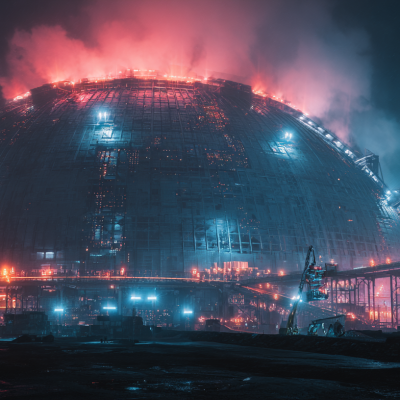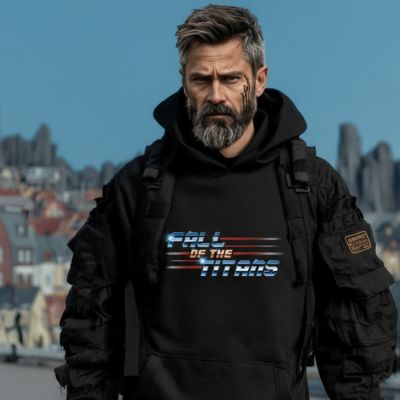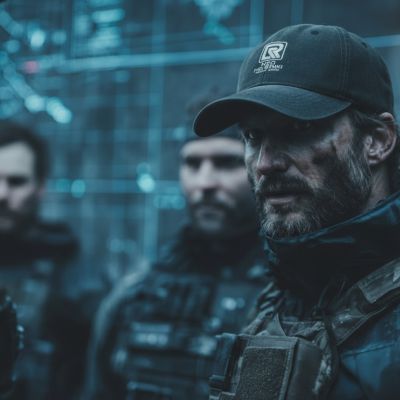Last Saturday, I woke up in a hotel room in Cologne, Germany, feeling absolutely terrible. My voice was destroyed—I sounded like a broken crow after the aircraft ventilation had done a number on my vocal cords. I was supposed to perform that night at Blue Shell for my first international gig, and half my setlist involved singing.
I was feeling low, honestly. The other guys—Ace Buchannon, Levinsky, and DJ BRU—went out to explore the city while I stayed behind, nursing my throat with German cough medicine and contemplating how to salvage the show.
And then something unexpected happened.
I finished “Stand Up and Fight.”
The Song That Wouldn’t End
Let me back up. “Stand Up and Fight” is the third track for Fall of the Titans II, and it’s been haunting me for months.
The beginning? Absolutely solid. Epic, even. I’d nailed the opening—this massive, building intro that perfectly captured the energy of its corresponding chapter. The kind of opening that makes you sit up and pay attention, that promises something big is coming.
And that was the problem.
How do you follow up an opening that epic? How do you maintain that energy, that promise, without the rest of the song feeling like a letdown? Every time I tried to continue it, something felt wrong. Too repetitive. Not enough development. Missed the mark emotionally. The song would start with this incredible surge and then just… deflate.
I’d been stuck on this creative block for so long that I’d almost convinced myself the song would stay unfinished forever, a beautiful fragment that never became whole.
The Gift of Uninterrupted Time
Here’s something I need to be honest about: I don’t get a lot of uninterrupted creative time.
I have a day job. I have a family with small kids. My music production happens in stolen hours—late at night after everyone’s asleep or early mornings before the day starts. It’s the reality of being an independent artist who isn’t (yet) doing this full-time.
Most of my studio sessions are 15min – 30 min, maybe 1h if I’m lucky. Just enough time to get into flow state before real life reasserts itself.
But Saturday in that Cologne hotel room? I had 4-5 hours of completely uninterrupted time. No interruptions. No responsibilities pulling at my attention. Just me, my laptop, Reason 13, and a song that needed finishing.
That kind of extended creative space is rare for me. It’s a luxury I dream about—the fantasy that one day, making music could be my full-time reality instead of something I squeeze into the margins of life.
The trip to Germany gave me that gift, even if it came wrapped in the disappointment of a broken voice.
The Breakthrough
I opened up the “Stand Up and Fight” project file, more out of habit than hope. I’d looked at this song so many times that I could probably recreate it from memory. That killer opening. Those unfinished sections. The notes about what needed to happen next that I’d written weeks ago and never solved.
But something was different this time.
Maybe it was being in a different country, a different headspace. Maybe it was the pre-show energy—that mixture of nerves and excitement about performing internationally for the first time. Maybe it was just that I finally had time to really dig in without watching the clock.
I started building on the foundation I’d laid months ago, but this time I wasn’t trying to match the opening. Instead, I focused on serving the story. What does this chapter need? What emotion are we building toward? What’s the journey from where the song starts to where it needs to end?
The corresponding chapter is about defiance in the face of impossible odds, about choosing to fight even when the rational choice is surrender. It’s about Krueger and the Wulf Pack making their stand, about that moment when you stop calculating survival odds and just commit.
Once I reconnected with that emotional truth, the rest of the song started flowing. Not easily—I still spent hours tweaking, adjusting, trying different approaches—but it felt right in a way it hadn’t before. The middle sections emerged. The build and release patterns made sense. The ending earned its impact.
By the time I needed to head to Blue Shell for soundcheck, “Stand Up and Fight” was done.
The Performance
That night, I played “Stand Up and Fight” live for the first time, mere hours after completing it. It was the tenth track in my set, and I’d completely rebuilt my setlist to be all-energy, all-instrumental because of my voice situation.
The German crowd at Blue Shell was incredible—they partied like there was no tomorrow. When “Stand Up and Fight” hit, fresh off its completion, there was something electric about it. Maybe I’m projecting, but it felt like they could sense that this track was special, that it had just been born that morning in a hotel room by a guy who couldn’t sing but could still speak through synthesizers.
The Lesson (If There Is One)
I’ve been thinking a lot about what made that breakthrough possible, and I think it comes down to a few things:
1. Sometimes you need distance. I’d been banging my head against “Stand Up and Fight” for so long that I couldn’t see it clearly anymore. Being in Germany, in a different context, gave me fresh perspective.
2. Extended creative time is powerful. Those 4-5 uninterrupted hours allowed me to go deep, to stay in flow state, to really live with the song until it revealed what it needed to be. This is why I’m working toward making music full-time someday—not for fame or money, but for the ability to have this kind of deep work regularly.
3. Constraints can be gifts. I was stuck in that hotel room feeling sorry for myself about my voice. But that constraint—having to stay put, having nothing else to do—created the conditions for the breakthrough. Sometimes limitations point you toward what you need.
4. Reconnecting with the story is key. When I stopped trying to make the song “epic” and started trying to make it true to its chapter, everything clicked. The story is always the north star.
The Reality of Being an Independent Artist
Look, I’m not going to pretend this is easy. Balancing a day job, family life, and this burning need to create—it’s exhausting sometimes. I see other artists who get to do this full-time, who have entire days to spend in the studio, and yeah, I feel that pang of envy.
But I’m also deeply grateful for what I do have. A family I love. Financial stability that lets me invest in this project without compromise. And moments like that Saturday in Cologne—rare, precious moments where everything aligns and something special happens.
The dream is to do this full-time someday. To have every Saturday be like that one, where I can spend 4-5 hours (or more) completely immersed in creation. Where I don’t have to steal time from sleep or family time.
Until then, I’m grateful for the stolen hours. For hotel rooms in foreign countries. For creative breakthroughs that come when you least expect them.
What’s Next
“Stand Up and Fight” is done, and it’s everything I hoped it would be after months of struggling. It’s going to be an absolute highlight of Fall of the Titans II, I can feel it.
But there are still many more tracks to finish. Many more chapters to score. Many more late nights and early mornings and stolen hours in the studio.
The Cologne trip reminded me why I do this. Not just the performance (though playing Blue Shell for that German crowd was absolutely incredible and a dream come true). But those hours in the hotel room, just me and the music, solving problems, finding flow, creating something that didn’t exist before.
That’s the drug. That’s what keeps me coming back, keeps me sacrificing sleep, keeps me working toward the day when I can do this without watching the clock.
The march to Titan continues, and now it has one more completed song lighting the way.
Sometimes you need to leave home to find what you’ve been searching for.





